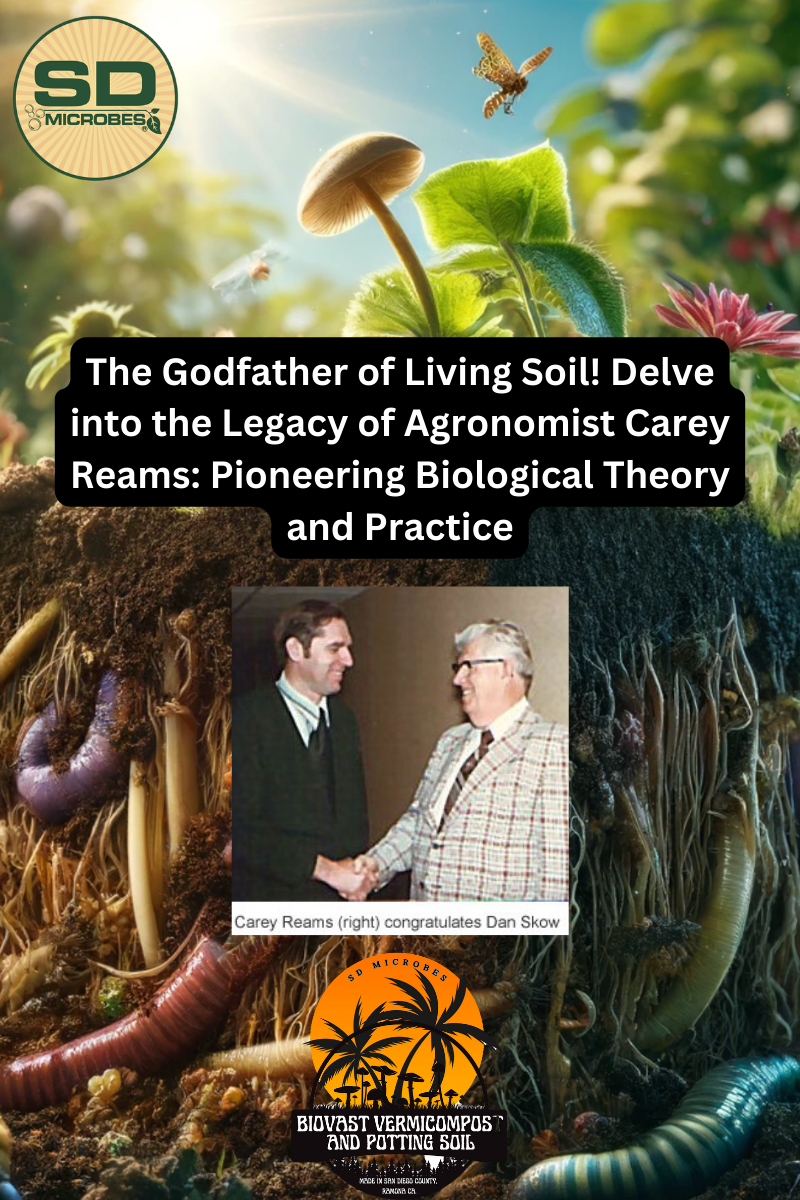
The Godfather of Living Soil! Delve into the Legacy of Carey Reams in Agriculture: Pioneering Biological Theory and Practice
Share

Carey Allen Reams, an American agronomist and biophysicist, left an indelible mark on agriculture with his innovative theories and practical applications. His work in the mid-20th century continues to influence modern agricultural practices, particularly those focusing on biological and sustainable farming. Reams' approach, often referred to as Reams Biological Theory of Ionization (RBTI), integrates principles of biophysics and agronomy, offering a holistic perspective on soil health and crop production.
Early Life and Education:
Carey Reams was born in 1903 in Rock Hill, South Carolina. His academic journey began with a strong interest in the natural sciences, eventually leading him to study agronomy and biophysics. Reams' diverse educational background equipped him with a unique perspective, allowing him to see the connections between soil chemistry, plant health, and human nutrition.
Development of the Reams Biological Theory of Ionization:
Reams' most significant contribution to agriculture is undoubtedly his Biological Theory of Ionization. This theory posits that the health of plants, animals, and humans is intrinsically linked to the electrical energy and mineral balance within the soil. According to Reams, optimal plant growth and nutrition can be achieved by maintaining the correct ionic balance in the soil, which he believed could be measured and adjusted through specific agricultural practices.
One of the core principles of RBTI is the idea that soil should be treated as a living entity. Reams advocated for the use of natural fertilizers and amendments to enhance soil life, rather than relying on synthetic chemicals. This approach not only promotes healthier crops but also contributes to the long-term sustainability of farming ecosystems.
Practical Applications and Impact
Reams' methods emphasized the importance of soil testing and the precise application of minerals to correct imbalances. He developed specific formulas for fertilizers based on the needs of different crops and soil types. His approach to soil management was revolutionary at the time, offering a more scientific and targeted alternative to the conventional, one-size-fits-all methods of fertilization.
Farmers who adopted Reams' techniques reported improved crop yields, enhanced plant resilience, and better nutritional quality of produce. His influence extended beyond the United States, as his teachings spread to other parts of the world, inspiring a global movement towards more sustainable and biologically-based farming practices.
Reams' Broader Influence on Agriculture:
Beyond his technical contributions, Reams was also a passionate educator. He conducted numerous workshops and seminars, teaching farmers and agronomists about the principles of RBTI. His ability to translate complex scientific concepts into practical advice made him a respected figure in the agricultural community.
Reams' holistic approach also touched on human health, as he believed that the nutritional quality of food directly affects overall well-being. He advocated for a diet rich in naturally grown, nutrient-dense foods, underscoring the connection between healthy soil, healthy plants, and healthy people.
Continuing Legacy:
Carey Reams passed away in 1985, but his legacy lives on through the many farmers, agronomists, and researchers who continue to apply and develop his theories. The principles of RBTI remain relevant today, particularly as the global agricultural community grapples with challenges related to soil degradation, climate change, and the need for sustainable farming practices.
In recent years, there has been a renewed interest in regenerative agriculture, which shares many of the same principles advocated by Reams. The emphasis on soil health, biodiversity, and ecological balance resonates with the core tenets of RBTI, demonstrating the enduring relevance of Reams' work.
Conclusion:
Carey Reams was a visionary whose contributions to agriculture have had a lasting impact. His Biological Theory of Ionization offered a new way of thinking about soil health and crop production, one that emphasized the importance of natural processes and the interconnectedness of all living things. As the world moves towards more sustainable and resilient agricultural systems, the pioneering work of Carey Reams continues to inspire and guide new generations of farmers and scientists.